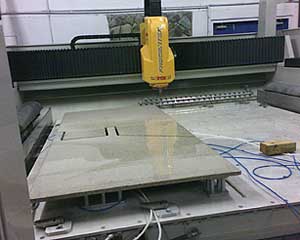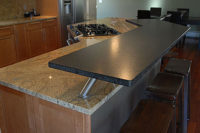
Although the industry appears to have turned the
corner, many stone fabrication shops are still feeling the pressure of today’s
economic climate. Some of the more successful shops in the field are the ones
equipped for a range of production. “We invested in machinery and technology
before the downturn,” said Miles Crowe of Crowe Custom Countertops in Atlanta, GA,
whose shop is pictured. “This has turned out to be a huge advantage for us
during the economic slump. We can simply do things that a lot of our
competitors cannot do.”
How would you assess the stone fabrication industry today? Are things really improving with some consistency? Is it tougher to deal with homeowners in this current environment? Speaking specifically, how has business been during 2010 as compared to a year ago? Compared to three years ago? How have you adjusted your business model to deal with the current economic climate? Are you ready to begin investing in large-scale machinery (or other technology)?
Cameron DeMille, MilleStone Marble and Tile Inc., Palm Desert, CA: Back in the day, not too long ago, you would find a licensed and insured fabricator, and you were good to go. The work was up to par, the service was acceptable, etc. Then came the lowballers and hacks. People realized the potential of a successful fabrication shop and decided they could do it, too. For the last several years - maybe even pushing a decade - we have had to deal with inexperienced, unintelligent, sneaky people that go to work every day for the sole purpose of making a dollar. These people have flourished in the economic downturn - with the combination of Chinese prefab granite and uninformed, uneducated consumers. People are coming out of the woodwork for deals, and they are getting them from the fly-by-nighters.
The economy IS starting to advance a tiny bit, which is showing signs of life from the more persnickety crowd. Unfortunately, this crowd is also uneducated when it comes to stone, and they are being taken by the hacks. This brings me to my point: It is difficult to convince clients that we are the company they should be hiring because we care, we do good work, and we will provide exceptional customer service. They just don’t seem to know the difference between the cheap guy and the more expensive guy . . . until they get burned - and they do get burned. Consumers have lost the sense of value and craftsmanship. We are an old school shop, with two bridge saws and a bunch of guys who really know what to do with their tools. Most people don’t care about attention to detail, or don’t understand what it means when someone is willing to spend an extra few hours making sure their countertop is going to look the way it should. They think “stone is stone,” and one fabricator is no different than the next.
The lowballers won’t be able to hang around when the economy gets going again; they just won’t be able to keep up. Then we’ll be fine. Right now is the issue. A mass education on a consumer level needs to be initiated so that people are armed with the knowledge and questions to ask, so that they themselves can make an educated decision and choose the fabricator that is right for them based on facts, not whatever the salesman is flinging their way.
I am seeing a disgusting amount of horrible work in homes worth no less than $2 million to 3 million dollars. The value of the home doesn’t mean anything, but when someone who is paying that much for a home - and then hires the cheapest fabricator - just blows my mind.

Kasco Stone of Tampa,
FL, invested in a Breton
Fabcenter during the “scariest” part of the economic downturn. “It is only the
fact that we have invested in the machinery and software that we are able to
separate ourselves from the hacks,” explained Scott McGourley of Kasco Stone.
“Customers generally don’t pay attention when you tell them you are better then
the lowballer. However, when you show them a $300,000 machine working, they
listen.”
I attribute any improvement in my market to large shops going out of business. This has allowed those left to survive. We have adjusted our business model to be able to make decent margins on low volume. In fact, we have raised prices recently in the face of the downturn. We are able to do this because we don’t need the volume. There will always be a few people out there that will pay for quality work.
We also did invest in a Breton Fabcenter during the scariest part of the crisis. We will continue to try and provide quality granite work at a reasonable price. It is only the fact that we have invested in the machinery and software that we are able to separate ourselves from the hacks. Customers generally don’t pay attention when you tell them you are better than the lowballer. However, when you show them a $300,000 machine working, they listen. This is the only surefire way I have found to bridge the gap.
I just wish we could stop suppliers from selling granite to the hacks.
As far as pricing goes, I feel there is an imaginary line out there that people follow. We have been guilty [in the past] on setting our pricing based on what we perceive others to be selling for. Now we set our prices on where we think they should be, without regard to the hacks. The main thing we have done is gotten away from square-foot pricing. Now it is labor and materials, and so far, it is making a big difference.
My feeling is that, in the future, you will see more smaller automated shops. It just does not make good sense in the long haul to continue to pay manual labor to make countertops. It is all about the five-year payment cycle. Once you get beyond that, the struggle is over. Until then, we will continue to try and survive like most other shops. Hopefully, when the economy rebounds, we will be in a position to make decent returns. We are in business to stay in business right now, with the hope that in a year we can make money.
Ken Lago, Granite Countertop Experts LLC, Hampton, VA: We are doing better this year than last year. Now the majority is direct sales, as opposed to the past where it was mostly wholesale through cabinet shops and builders. This has given us the opportunity to control the sales process, and we have gotten away from square-foot pricing completely. When customers sit down with us, we educate them on materials. We have found that once they realize that they have an amazing amount of choices in colors, they tend to go with more interesting stones. Having a cabinet salesperson or a builder selling your product is, in my opinion, a road to nowhere. All they want is to add a 25 percent commission to your bill after they have beaten you down.
Concerning the economy as a whole, I think we are past the worst.
Boyd McGuire, All Stone Granite, Tulsa, OK:
How would you assess the stone fabrication industry today?
It’s consolidated, to some extent. Some of the smaller shops are now selling “donuts,” again. Some of the mega-shops finally discovered that the first thing to discard is not reasonable margins. That discovery came too late for most.
Are things really improving with some consistency?
To a degree. It’s still a bit sketchy, but improving.
Is it tougher to deal with homeowners in this current environment?
The wording of that question pre-supposes that “environment” makes homeowners easier or harder. I can’t buy that premise. Having dealt with almost all homeowners for many years, you get good ones and less-than-good ones. And you get some out-and-out bad ones. The perceived state of the economy matters very little. Human nature doesn’t change very much.
One more note on that: We’re in Tulsa - not in Florida or Las Vegas or Southern California, where things are wildly different than in the Midwest. We tend to be flat-liners with regard to growth. There are no unsustainable swings one way or the other.
Specifically, how has business been during 2010 as compared to a year ago? Compared to three years ago?
We had two of our best months of all time a couple of months ago. And we’re back on par with a couple of years ago. We’re doing better than three years ago.
How have you adjusted your business model to deal with the current economic climate?
The only thing we had to adjust to was buying patterns. (i.e. the type of offerings we bring in). Sales of basics have spiked. Suppliers complain that $20+ per-square-foot, 3-cm slabs will sit for long periods before they are forced to discount them to move. Exotics used to be what we specialized in; thus, we imported.
The suppliers have begun to bring in relatively nice second- and third-choice basics. Thus, their prices are down - so much so that it makes little sense to go through the hassle of importing to save $0.75 per square foot.
Are you ready to begin investing in large-scale machinery (or other technology)?
We actually did that several years ago, so we don’t need to address that. I have not seen anything put forward recently that would sway that opinion. However, if I see something new that has a nice ROI (return on investment), I would not preclude it.
We have been playing with a few new avenues - with the help and input of some of my SFA brothers - in order to bring something “new” to the market. Things are going well so far.
Miles Crowe, Crowe Custom Countertops, Inc., Atlanta, GA: I would say that the economic downturn has accelerated the maturation of our industry to an extent. Like Boyd said, there has been some widespread consolidation by both fabricators and suppliers. To some degree, the strong have gotten stronger, and the weak have disappeared.
Our business has continued to grow. The last two years have been phenomenal for us. But our business today barely resembles our business of two or three years ago. We have diversified our product offering. We have been forced to streamline our processes. We have acquired other businesses. Our business has doubled in the last two years.
We have found that homeowners are so much more educated on the process than they were a couple of years ago. Every homeowner now knows that he can find someone to install Ubatuba in our market for around 30 bucks a square foot. Every homeowner shops around. They all know how to negotiate.
What we continue to find, however, is that homeowners are still willing to spend money. They just want more bang for their buck. Ultimately, they have set a budget and they want the most they can get and stay within budget. They are not necessarily trying to get off as cheaply as possible.
Like Boyd, we invested in machinery and technology before the downturn. This has turned out to be a huge advantage for us during the economic slump. We can simply do things that a lot of our competitors cannot do.
In the last two years, most of our investing is in growth and inventory. We are stocking close to 1,000 slabs. We are always looking for the right opportunities to expand.
Steven Nenzel, Rock-It Surfaces, San Marcos, CA: I agree with Miles; the downturn has accelerated the maturation of the industry. However, the impact of the downturn is very regional, as Boyd has said. California’s economy is in the toilet compared to some other states. The state is showing a drop of people’s income of $40 billion over last year. In addition, the housing market is not improving, and it is likely to see another downturn the last half of this year as a second wave of foreclosures begins to hit the market. Here, we are seeing a lot of shops that are still barely hanging on, so we will likely see more go out of business this year and early next year.
With that said, our numbers are up from last year as a result of aggressive entry pricing (not entry-level sales), our product selection and our excellent retail location. As a one-stop-shop business model, we appeal to the mature, conservative, value-oriented (not necessarily price-driven) buyer. We have geared our business model to cater to a specific market that has been least impacted by the downturn. Selling direct to homeowners is key to surviving, as you are more in control of your destiny. Some of this year’s increase may be a result of fewer competitors, but that is hard to substantiate.
In our market, now is not the time to make any significant purchases of equipment. I feel we are going to see another wave of panic set in, and wallets will close. We will continue to look for ways to add value, increase our volume, and at the same time, reduce our expense. In San Diego, it is going to come down to who has the best business model and who can hang on the longest.

